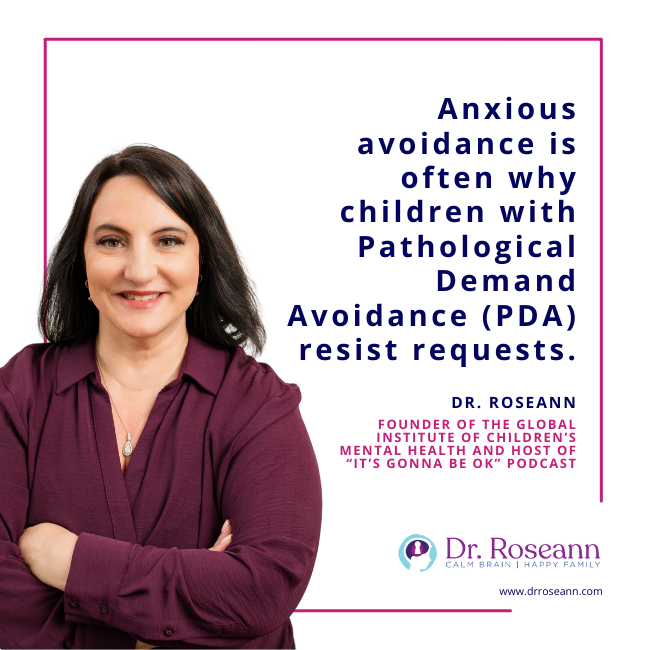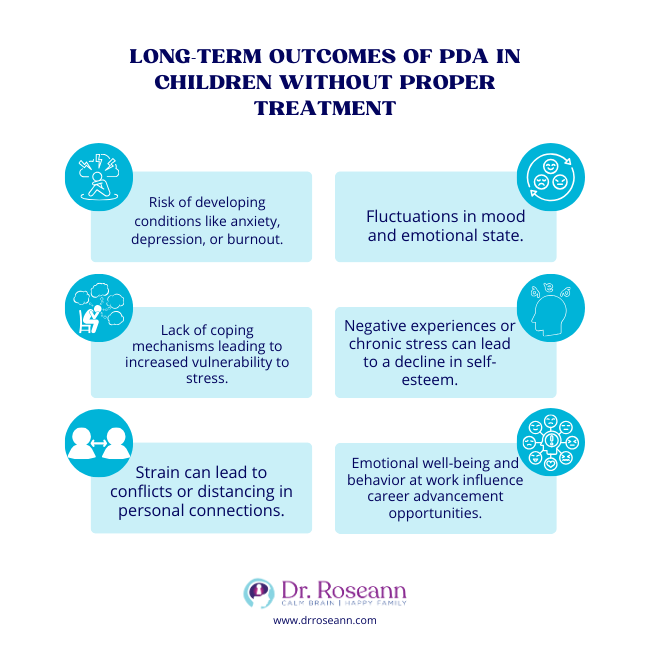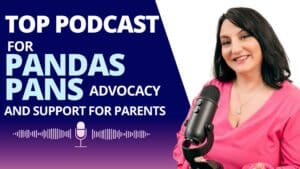A child who seems allergic to the word “no” may not be simply defiant, but intensely, almost viscerally opposed to any perceived demand, instruction, or expectation from authority figures. The extreme avoidance of everyday demands is the essence of a condition called Pathological Demand Avoidance (PDA).
As the core feature of Pathological Demand Avoidance in children includes resistance to an extreme extent, expect the child to experience tantrums and meltdowns after giving them the simple request of brushing their teeth or tying their shoelaces. Many children with PDA have heightened sensory issues, making certain demands, like haircuts or noisy environments, particularly overwhelming (Kildahl et al., 2021).
Some parents think it’s just stubbornness, but it’s a deep-seated intolerance of uncertainty. For these children with PDA, any perceived loss of control is met with fierce pushback. They may also result in the use of social strategies such as negotiation, distraction, and even pretending.
They'll use every tool in their arsenal to avoid direct or implied demands, and they sometimes appear manipulative. Without appropriate support, anxiety and frustration will start to simmer beneath the surface, leading to unpredictable emotional outbursts and potential panic attacks.
Pathological Demand Avoidance Beyond the Obvious
With the absence of a diagnostic tool from the Diagnostic and Statistical Manual of Mental Disorders, PDA, just like Oppositional Defiant Disorder, is a profile and not a diagnosis. While often linked to Autism Spectrum Disorder (ASD), PDA isn't yet a formal diagnosis itself, but part of the autism spectrum (Green et al., 2018).
Think of it as a unique way experience for autistic people. It's more about feeling unsafe, and the resistance isn't about being “bad,” but more about protecting themselves from what feels like a threat to their autonomy and sense of control.
Autistic children with PDA traits are not manipulative though their strategies are a desperate attempt to stay in control.

Anxious avoidance is often the driver of these behaviors. Paul was a boy with PDA that I worked with that struggled with anxiety for any task or event that was off schedule. His parents homeschooled him in order to support his emotional regulation and Paul was able to do much better.
It’s not a calculated manipulation so they need empathy, not force. Punishments and power struggles only fuel the fire. Understanding and support are key in managing this pervasive developmental disorder.
The Effects of Extreme Demand Avoidance in Children
The Pathological Demand Avoidance Syndrome in children can be significant and far-reaching, impacting various aspects of their lives.
Here are examples of how defying the ordinary demands of life can affect your child:
1. Daily Responsibilities
Challenges with routine and self-care. Simple tasks like brushing teeth, getting dressed, or going to bed can become major battles due to intense resistance to demands. This can impact personal hygiene, sleep patterns, and overall well-being.
Example: Lucas avoids haircuts like the plague. It's not the scissors, it's the feeling of someone else controlling his body.
2. Social Difficulties
The fear of losing control and extreme anxiety in social situations can lead to withdrawal, isolation, and challenges with making and maintaining friendships.
Example: Alex consistently throws a tantrum to avoid joining social gatherings. It's not defiance, but a way of managing anxiety when doing group activities.
3. Academic Struggles
Schoolwork can be particularly challenging due to difficulties following instructions, completing assignments, and participating in classroom activities. This can lead to academic delays and frustration.
Example: Sarah melts down every time the teacher asks her to sit down. She doesn’t intend to act refuse the task but she just feels trapped and wants to avoid the task,
4. Family Stress
Living with PDA individuals can be emotionally and physically draining for caregivers because of conflict. Their pattern of behavior consisting of constant meltdowns, resistance, excessive mood swings, and anxiety can take a toll on family relationships and dynamics.
Example: Emma constantly negotiates. It's not always defiance, it's her way of feeling in control.
Emotional and Mental Health Effects of PDA in Kids
The constant struggle to avoid demands and navigate a world that feels full of expectations can lead to significant anxiety and depression. Furthermore, negative experiences and challenges with social interaction can contribute to feelings of low self-esteem and inadequacy.
The frustration and anxiety from feeling misunderstood and unable to cope with demands can manifest in frequent meltdowns and emotional outbursts. Since young people tend to lack coping skills and strategies for managing emotions, they usually show unpredictable emotional responses and challenges with self-regulation.
Long-Term Outcomes of PDA in Children

Difficulties with schoolwork and social interaction can make it challenging to continue education or secure employment later in life. Additionally, untreated PDA as a profile of autism can lead to social isolation and difficulties maintaining relationships, impacting the quality of their daily life and potentially affecting future friendships and romantic relationships.
These children are likely to experience other challenges in the future as undiagnosed anxiety and depression can significantly impact their mental health and physical well-being throughout life.
However, it's also important to note that every child with PDA is unique, and the effects can vary in severity and manifestation. Early intervention, tailored support, and understanding can help mitigate these negative consequences and empower PDA children to reach their full potential.
The BrainBehaviorResetTM Program can help your child with PDA navigate these challenges and thrive. The program incorporates the use of natural, science-backed solutions, such as neurofeedback, PEMF, and magnesium supplements to help children with PDA avoidance behaviours or autism diagnosis manage their condition better and lead quality lives.
Parent Action
Steps
☐ Learn more about emotional regulation by listening to my podcast, It’s Gonna Be OK!
☐ Acknowledge that PDA behaviors are just simple defiance but involve intense resistance.
☐ Navigate sensory overload challenges with routine and self-care by offering choices.
☐ Work with educators and healthcare professionals to learn social skills and get comfortable in role play and pretending to address difficulties in following instructions.
☐ Seek early intervention, explore tailored support options, and professional help from the National Autistic Society or any local PDA society.
☐ Take the Solutions Matcher to get personalized treatment for your child.
Citations
Green, J., Absoud, M., Grahame, V., Malik, O., Simonoff, E., Le Couteur, A., & Baird, G. (2018). Pathological Demand Avoidance: symptoms but not a syndrome. The Lancet Child & Adolescent Health, 2(6), 455–464. https://doi.org/10.1016/s2352-4642(18)30044-0
Kildahl, A. N., Helverschou, S. B., Rysstad, A. L., Wigaard, E., Hellerud, J. M., Ludvigsen, L. B., & Howlin, P. (2021). Pathological demand avoidance in children and adolescents: A systematic review. Autism, 25(8), 136236132110343. https://doi.org/10.1177/13623613211034382
Dr. Roseann is a mental health expert who frequently is in the media:
- Helping Children Thrive Podcast Benefits of Neurofeedback for children with ADHD
- Very Well Mind New Research Highlights Key Differences Among Autistic Boys and Girls
- She Knows 11 Products Moms of Kids With ADHD Swear By to Maintain Order in the Chaos
- Very Well Mind What Is Asperger Syndrome?
Are you looking for SOLUTIONS for your struggling child or teen?
Dr. Roseann and her team are all about science-backed solutions, so you are in the right place!
Grab your complimentary copy of
147 Therapist-Endorsed Self-Regulation Strategies for Children: A Practical Guide for Parents
Dr. Roseann is a Children’s Mental Health Expert and Licensed Therapist who has been featured in/on hundreds of media outlets including The Mel Robbins Show, CBS, NBC, PIX11 NYC, Today, FORBES, CNN, The New York Times, The Washington Post, Business Insider, Women’s Day, Healthline, CNET, Parade Magazine and PARENTS. FORBES called her, “A thought leader in children’s mental health.”

She coined the terms, “Re-entry panic syndrome” and “eco-anxiety” and is a frequent contributor to media on mental health.
Dr. Roseann Capanna-Hodge has three decades of experience in working with children, teens and their families with attention-deficit hyperactivity disorder (ADHD), autism, concussion, dyslexia and learning disability, anxiety, Obsessive Compulsive Disorder (OCD), depression and mood disorder, Lyme Disease, and PANS/PANDAS using science-backed natural mental health solutions such as supplements, magnesium, nutrition, QEEG Brain maps, neurofeedback, PEMF, psychotherapy and other non-medication approaches.
She is the author of three bestselling books, It’s Gonna Be OK!: Proven Ways to Improve Your Child's Mental Health, The Teletherapy Toolkit, and Brain Under Attack. Dr. Roseann is known for offering a message of hope through science-endorsed methods that promote a calm brain.
Her trademarked BrainBehaviorResetⓇ Program and It’s Gonna be OK!Ⓡ Podcast has been a cornerstone for thousands of parents facing mental health, behavioral or neurodevelopmental challenges.
She is the founder and director of The Global Institute of Children’s Mental Health, Neurotastic™Brain Formulas and Dr. Roseann Capanna-Hodge, LLC. Dr. Roseann is a Board Certified Neurofeedback (BCN) Practitioner, a Board Member of the Northeast Region Biofeedback Society (NRBS), Certified Integrative Mental Health Professional (CIMHP) and an Amen Clinic Certified Brain Health Coach. She is also a member of The International Lyme Disease and Associated Disease Society (ILADS), The American Psychological Association (APA), Anxiety and Depression Association of America (ADAA) National Association of School Psychologists (NASP), International OCD Foundation (IOCDF).
© Roseann-Capanna-Hodge, LLC 2024










